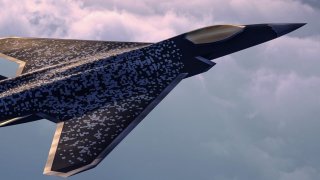FCAS: Future Combat Air System Is Europe's Plan for 6th Generation Fighter
FCAS has been seen as crucial to European strategic autonomy, as it could further strengthen political and military ties between two of its biggest economies while also enhancing the European aerospace industry.
Last week, a French official shared some insight on the future of the multi-national Future Combat Air System (FCAS) program. According to Major General Jean-Luc Moritz, who leads the French initiative of the Franco-German-Spanish program, told the Association of Aeronautic and Space Journalists (AJPAE) that four different designs are being considered – with a final choice to be made in early 2025.
More than a single aircraft, FCAS is a combat "system of systems" under development by Dassault Aviation, Airbus, and Indra Sistemas.
The goal of the program is to replace France's Rafales, Germany's Typhoons, and Spain's EF-18 Hornets. In June, Belgium officially joined the FCAS program as an observer.
FCAS will consist of a sixth-generation jet fighter as well as unmanned aerial systems (UAS) – dubbed Remote Carriers that could be connected via a combat "cloud." The next-generation weapons system (NGWS) will be able to deploy autonomously or via a network with other airborne, naval, land, and even space-based combat or command systems.
A test flight demonstrator is expected around 2027.
Germany Increasing NATO Spending
It was also last week that German Defense Minister Boris Pistorius confirmed that Berlin will meet its NATO spending target of two percent of economic output, even after a special 100 billion euro ($106 billion) defense fund has been exhausted.
However, German Chancellor Olaf Scholz's three-way coalition government is haggling over spending commitments for next year's budget. There has been speculation that could impact FCAS – but both Scholz and Pistorius have reaffirmed their support for the program.
Pistorius also denied reports that Berlin was considering walking away from the deal due to disputes over design and financing.
"It is my strong intention to continue the projects of the future fighter jet system FCAS and the tank system MGCS together with France, and make them a success," he told a meeting of German generals.
The three primary partner nations have to date pledged 3.2 billion euros for phase 1B, which runs for three and a half years, with an option for a further five billion euros for phase 2.
FCAS has been seen as crucial to European strategic autonomy, as it could further strengthen political and military ties between two of its biggest economies while also enhancing the European aerospace industry.
The Other European Program
FCAS isn't the only sixth-generation program underway in Europe – as the competing Global Combat Air Programme (GCAP) is now moving forward.
Also known as "Tempest" – and previously as the Future Combat Air System – the effort is being developed as a partnership involving the UK, Italy, and Japan, which are sharing the research and development (R&D) costs while developing new cutting-edge technologies. Last December, it officially saw London and Tokyo merge their previously separate projects.
Japan and Sweden further signed an agreement on possible future cooperation, while Saudi Arabia has pushed to join the program with tentative support from the UK and Italy. However, Tokyo has expressed opposition to Riyadh's participation – citing its defense export rules.
Author Experience and Expertise
A Senior Editor for 19FortyFive, Peter Suciu is a Michigan-based writer. He has contributed to more than four dozen magazines, newspapers, and websites with over 3,200 published pieces over a twenty-year career in journalism. He regularly writes about military hardware, firearms history, cybersecurity, politics, and international affairs. Peter is also a Contributing Writer for Forbes.
Image Credit: Dussault/Industry Handout.


